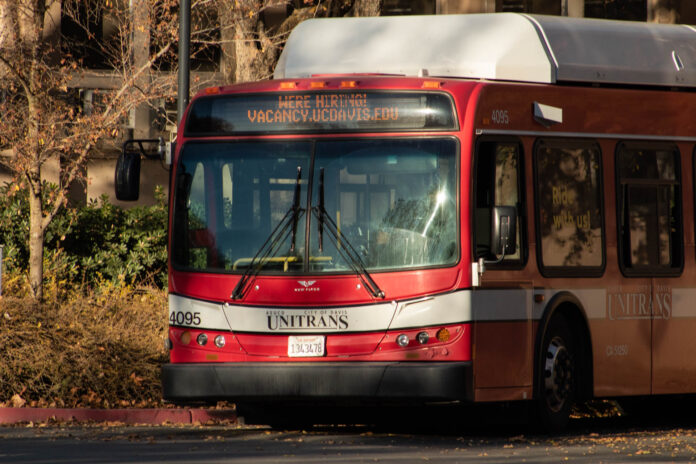Unitrans has increased its safety precautions and hourly wages for drivers to combat the projected driver shortage once the pandemic subsides
Due to the pandemic, Unitrans is currently operating at reduced service. Once services return to normal, however, they are expecting a significant shortage of drivers: less than half the amount needed to operate regular service. Unitrans has put several health and safety measures in place and will be increasing hourly pay starting on Jan. 1, 2021.
According to Jeff Flynn, the general manager of Unitrans, the company values the time and safety of its employees. Unitrans has implemented new safety protocols, which have been in effect since the early months of the pandemic. Flynn also emphasized that Unitrans pays during training, with a starting wage of $16.25. This wage increases to $17.75 for frontline driver shifts during Winter Quarter.
“Not only do we recognize that health and safety is a big concern for people, but we also know that a lot of people lost their jobs in the service industry and there [are] fewer jobs available on campus,” Flynn said. “So we’re hoping that through our wages that we can also attract people to the job.”
Each bus now has an installed plastic barrier in between the drivers and passengers. There are red lines on the floor to indicate where passengers should stand in order to stay six feet away from others. Their formerly-cloth seats have been replaced with plastic, which are easier to clean, and drivers no longer have to handle cash as customers place their payments in a farebox.
There is also now a maximum capacity of 18 people per bus, and all windows are open for ventilation in order to maximize air flow. Unitrans provides its staff with Personal Protective Equipment (PPE) including disposable masks, washable masks, sanitizing wipes and hand sanitizer.
Every day, employees clean the interior of each bus with two different solutions in the form of a spray and a fog machine. In addition, drivers are required to wipe down their work area before and after each shift.
“We’re taking [health and safety] very seriously,” Flynn said. “We need to do whatever we can do to make people as comfortable as possible and as safe as possible while they’re working for us.”
Flynn noted that it usually takes about 175 drivers to operate regular bus service. Unitrans currently has about 115 drivers, which is only enough to provide reduced service. By the end of this school year, many drivers will graduate, leaving about 70 drivers. If the pandemic subsides by next fall and the bus service is expected to return to normal, there will be a severe shortage of drivers.
“On a typical academic year, we carry 22,000 to 23,000 people per day,” Flynn said. “Now, if the bus service is half of what it is, or less, then that’s 10,000 or more people that have to get to campus a different way. We already know that there are constraints on both car parking and bike parking here. So that’s a lot more people to accommodate if the bus system isn’t ready to carry those people.”
Unitrans is working to recruit as many people as they can before Spring Quarter, as it takes about three to five months to train drivers. They have also updated their training process in order to limit in-person contact.
Rufhiline Tolosa, a career driver trainer at Unitrans, explained that the first part of driver training, which is typically held in a classroom, is now being conducted over Zoom. Trainees are only required to meet in person once they begin route training, during which they start driving the bus. During route training, each trainee is accompanied by a trainer, who is required to stay six feet away from them when possible and wear a face shield.
“[The lack of new trainees] was definitely noticeable during the summer because, usually, that’s when we hire and train a lot,” Tolosa said. “In the summer, students usually have free time or they’re taking summer classes, but they’re not here right now. We didn’t really have a lot of people applying for the position.”
Tolosa encourages students to apply as Unitrans drivers because of the flexible schedule, the high hourly wages and the strong sense of community.
“I think Unitrans is a great place to work,” Tolosa said. “Honestly, that’s why I stayed after I graduated. We probably have the friendliest trainers you can find. Also, it’s a really great community. We have a very diverse population in our company.“
Maya Yoshikawa, a fourth-year environmental science and management and history double major, is both a Unitrans driver and the transit driver manager. Yoshikawa also stated the supportive community that she has found during her time at Unitrans.
“Driving is really flexible,” Yoshikawa said. “I could add shifts or cover for other people or get my shifts covered when I had midterms really easily. Since they’re only one-hour-long shifts, it’s relatively easy. And because we’re all student drivers, we all understand each other.”
While she was apprehensive about driving a bus when she first applied for the job, Yoshikawa said that new drivers don’t have to drive by themselves until they feel comfortable.
”Because of how much driver training there is, and then route training after, by the time I did get ‘solo’ and drove a bus by myself, I was more comfortable driving the bus than my car,” Yoshikawa said.
Yoshikawa highly recommends applying for Unitrans, not only to help address the projected driver shortage, but also to gain a unique, personal experience.
“Because you’re operating a large vehicle with a lot of people, it is a team effort,” Yoshikawa said. “And we really do become a team. It’s a very rewarding job that can be flexible to your schedule. Then it’s also fun, of course, and it’s a unique UC Davis thing. It’s a really amazing opportunity.”
Written by: Liana Mae Atizado— features@theaggie.org










